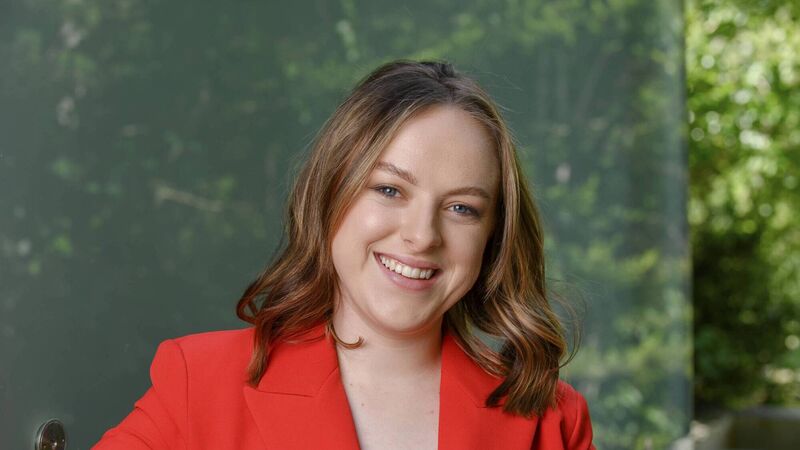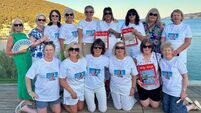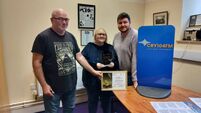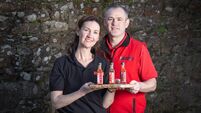Cork-based graduate creates new voice therapy app for people with Parkinson’s disease

Clare Meskill. Pic Daragh Mc Sweeney/Provision
RESEARCH by Harvard Business Review finds that firms achieve the most significant performance improvements when humans and machines work together.
They conclude that with “collaborative intelligence, humans and AI actively enhance each other’s complementary strengths: the leadership, teamwork, creativity, and social skills of the former, and the speed, scalability, and quantitative capabilities of the latter.”
Clare Meskill, recent winner of UCC’s Start Up Award, is a perfect example of how true this can be, not only in business but in medical care.
Having completed her degree in Speech and Language Therapy at the Cork university, the young entrepreneur entered their IGNITE department.
She is now running a business called Teleatherapy, in the field of Parkinson’s, having developed a phone app that supports patients on an ongoing basis.
“This is a merging of clinical skills and technology to provide a better, more expansive and personally tailored service to people in our care,” said Clare.
Necessity as Invention
As she sees it, Covid helped make her impressive business idea all the more possible.
“I graduated during Covid, right in the middle of a global pandemic so I was worried about getting work. I decided on the IGNITE Programme because I felt like I’d nothing to lose.”
The pandemic also increased people’s comfort with technology, she explains, which supports Meskill’s particular brand of innovation.
“Covid revealed the power of technology to connect people. More people, especially older people, got to grips with new ways of communicating, like through zoom for instance.
“Covid showed us just how adaptable people can be when it comes to technology. So now, having an initial consultation over zoom doesn’t seem so strange. It’s become quite normal to us, and this helps programmes like ours to benefit a larger community, to reach across Ireland and eventually, the world.”
About The App
Clare explains the basics of Parkinson’s first.
“Parkinson’s develops in a brain when it produces less dopamine. It’s often thought of as an elderly person’s disease but 5% of cases occur in people before 50. It is a boutique illness, so patients have different symptoms, but in 90% of cases, the voice is affected, becoming weaker over time.”
These are the people she hopes to help.
“In my training, shadowing therapists, I saw patients who had been left too long without care and so the deterioration in their voice had really progressed. It was too late for them. It’s important that we get in early and keep those muscles strong.
“Like any exercise, people need to be consistent with it if they want to see results. The app provides ongoing support and monitors the individual’s progress between appointments.”
It all seems refreshingly straight-forward. The patient is seen by a therapist and is given a personally tailored programme to complete through their phone. The human connection is there, through the therapist, but technology allows clinicians to do more work in an ongoing more consistent manner. The app makes the most of the initial consultation by providing ongoing care through technology.
“I was aware that people weren’t getting helped early enough and then they were being sent home with a piece of paper with exercises to complete on their own. With the greatest will in the world, a piece of paper can be ignored or forgotten about.
“With this app, the therapist is alerted if somebody fails to do their exercises for a week maybe. The therapist can then reach out to the patient. That limit can vary depending on the size of the clinic of course. The app is tailored to both the patient and the therapist to fit the context.”
Problem Solving
During her training, Clare observed there was nobody working in the field of Parkinson’s and that many therapists are stretched across different cases.
“It is a significant problem, but no-one is devoted to the condition in a singular way. This app allows me to give it that focus but in a more expansive way, by offering clinics a bespoke Parkinson’s app for their patients.”
She had originally intended to work in paediatrics, but saw how impactful therapies with Parkinson’s sufferers can be.
“I saw people’s lives being transformed during my training. They went from being unable to make a phone call, to having the same voice capacity as anyone. They had been struggling socially and mentally, straining to be heard across dinner tables. When I saw them regaining their vocal abilities it was inspiring. The therapy changed their lives. It’s great to know and to share a real solution to a real problem.”
Like any good business idea, Clare recognised an app of this nature was n0t being used in the Irish market.
“There’s nothing like this that I’m aware of, providing a personally tailored service to sufferers of Parkinson’s. This isn’t the same as just downloading an app from the internet because this is clinician led and clinician monitored. It means that when someone has a follow-up meeting 12 months later, the intervention has been ongoing since the first consultation. It keeps that relationship and focus going.”
A Bright Future Ahead
Business is looking good for Clare and her team.
“We’ve been trialling it since July 2021. We work around the country with different branches of the Parkinson’s Association of Ireland, and also with independent users.
“The next step will be to roll it out to the HSE, which is being backed by Health Innovation Hub Ireland, whose main office is also here in UCC.”
Clare has just moved into office space on UCC campus and is settling in with her innovative team of three.
“We collaborate a lot on the app design. If our software engineer decides to use three buttons, for instance, I might query that because a patient might have a tremor. I offer that critical review, but he has the technical savvy to create the product in the end.”
She stresses just how supportive UCC has been.
“I would not have a business if it wasn’t for the IGNITE Programme.
"They were so helpful. It’s basically an incubator for start-up businesses. They provide people with a business idea with space, mentorship and help develop that idea into a business. I had a prototype and a paying costumer within nine months of starting with them. They are so approachable too.”
The IGNITE programme currently accepts a new cohort every three months. They also offer night workshops for anybody with daytime commitments or in full-time employment.
“I’d also like to thank the Local Enterprise Office and Cork’s Business Innovation Centre. They were so helpful in guiding us through.”
Clare is also currently completing a research masters at the university.
“I must admit, at times the business is coming first right now, but it’s good for me to keep up my research alongside it. I’m taking longer than most, but I think that’s okay really.”
I leave her feeling convinced the collaborative intelligence of her app is the first step in a long and impressive career.







 App?
App?





